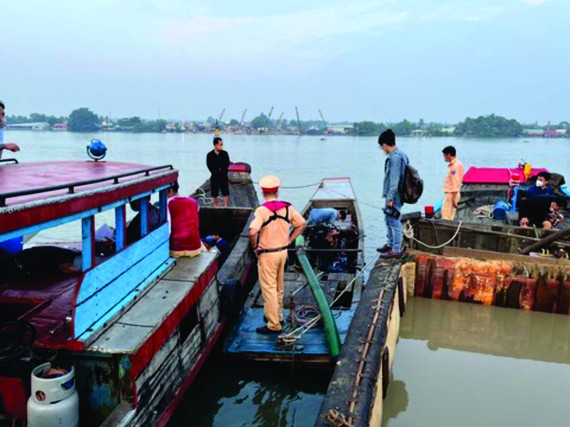 Society
Society

 |
| An illegal sand mining boat detected in Cần Giờ District. — Photo www.sggp.org.vn |
HCM CITY — The HCM City People’s Committee has assigned the Department of Natural Resources and Environment in collaboration with relevant agencies and local authorities to strengthen patrols and resolutely deter illegal sand mining in the city.
The city’s economy had been on track to recover after the COVID-19 pandemic, and infrastructure development and renovation of old apartments have led to high demand for sand for construction.
The city has even stopped greenlighting sand mining for the last 10 years. Meanwhile, sand exploitation permits are issued in a limited way in other provinces.
However, illegal sand mining along the city's rivers continues to increase, causing loss of natural resources and environmental pollution. In addition, many who see the large profits that can be earned from illegal sand mining are willing to ignore legal regulations.
Hot spots of illegal sand exploitation in the city are along the Đồng Nai, Tắc and Sài Gòn rivers in Củ Chi District, and the coastal areas in Cần Giờ District.
Illegal sand miners normally work in bordering areas between districts late at night, when rivers are deserted. They use large-capacity pumps to mine sand and quickly transfer this volume to smaller boats for distribution.
Cần Giờ District’s People’s Committee vice chairman Trương Tiến Triển said the district has discovered and handled 23 cases of illegal sand exploitation and transportation, imposed fines of VNĐ1.3 billion (US$53,900), and retrieved nearly 8,400cu.m of sand in the first 11 months of the year.
According to the extension of the current project ‘Combating illegal sand mining in Cần Giờ waters bordering HCM City’ in the 2023-26 period, key measures such as building border checkpoints and allocating public investment to buy suitable motorboats for patrols will be carried out.
Đinh Hoài Phong, deputy head of Củ Chi District’s sub-department of Natural Resources and Environment, said this year the district’s interdisciplinary inspection team and functional forces have conducted about 10 unexpected inspections together with regular night patrols along Sài Gòn River to actively stop illegal sand mining.
They detected one case of illegal sand mining, retrieved 15 cubic metres of sand, and imposed an administrative fine of VNĐ5.5 million ($228) on trading minerals of unknown origin so far this year.
However, local authorities are facing many challenges in the task of fighting illegal sand mining.
“It is very tough to patrol quietly on the rivers at night in order to put in place unexpected inspections of illegal sand mining areas," he said. "Illegal miners often use sophisticated equipment and assign guards to warn them in advance when detecting patrol teams.
The district is going to increase inspections along the section of Sài Gòn River under its management. In addition, the local authorities are encouraging construction material shops along this river to commit to refusing goods with unknown origin.
Residents living near the river are mobilised not to perform illegal sand mining actions and immediately report to the police any suspected mining.
Nguyễn Thị Thanh Mỹ, deputy director of the city’s Department of Natural Resources and Environment, said authorities face difficulties in preventing and controlling illegal sand exploitation in the city.
Information exchanges between HCM City and its neighboring provinces about illegal sand mining activities have not been effective enough in past years, she said.
Moreover, the current sanctions for illegal trading, transporting, storing, and consuming minerals with unknown origin are not enough of a deterrent.
To strictly deal with the problem, the department is working with relevant units and agencies to develop a detailed plan with proposals of more effective measures and stronger sanctions. — VNS




